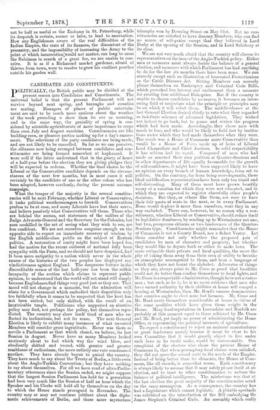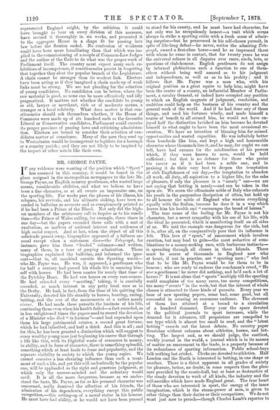CANDIDATES AND CONSTITUENTS.
POLITICALLY, the British public may be divided at the present season into Candidates and Constituents. The universal belief is that the present Parliament will not survive beyond next spring, and boroughs and counties are mating. Managers of places of public entertain- ment are said to be much more anxious about the weather of the week preceding a show than its eve or morning, and in the same way, the geniality of spring is con- sidered by scientific agriculturists of more importance to crops than even July and August sunshine. Constituencies are like budding corn, or pleasure parties making up for a day's amuse- ment. The selections of the party candidates are being made, and are not likely to be cancelled. So far as we can perceive, the alliances now being arranged between candidates and con- stituencies are being formed somewhat at haphazard. It were well if the latter understood that in the gaiety of heart of a half-year before the election they are giving pledges they will be expected to redeem. Whether the final choice be the Liberal or the Conservative candidate depends on the circum- stances of the next few months, but in most cases it will certainly be the candidate of one or the other colour who has been adopted, however carelessly, during the present autumn campaign.
What the temper of the majority in the several constitu- encies will be next February, whether Liberal or Conservative, it tasks political weathermongers to foretell. Conservatives profess to be at ease, and many Liberals have lost their nerve, and believe passively what Conservatives tell them. Those who are behind the scenes, not statesmen of the calibre of the Judge Advocate-General and the Secretary for the Colonies, but men unskilled in the art of seeing what they wish to see, are less confident. We are not ourselves sanguine enough on the opposite side to expect an immediate recovery of wisdom by the English middle-class public on the subject of Eastern politics. A restoration of sanity might have been hoped for, had the motive for the recent outburst of national folly been sympathy with the Porte, and we should not have despaired, had it been mere antipathy to a nation which never in the whole course of the histories of the two peoples has displayed any vindictiveness against England. The dangerous feature in the discreditable scenes of the last half-year has been the selfish incapacity of the section which claims to represent public opinion, to understand that the world will not stand still simply because Englishmen find things very good just as they are. That mood will not change in a moment, but the admiration will abate for a Government which embodied their disposition only too faithfully when it conies to be suspected that the knot has not been untied, but only shifted, with the result of an inextricable tangle. Politicians who supported an abortive policy may find, not perhaps the policy, but themselves repu- diated. The country may show itself tired of men who re- flected its inclinations, but not its sense. The next General Election is likely to exhibit many instances of what unseated Members will consider gross ingratitude. Never was there so servile a Parliament as that which closed, we believe, its last Session in August. Never have so many Members looked anxiously about to feel which way the wind blew, and obediently shifted and veered, with greater and greater semblance of enthusiasm, the more entirely one vote condemned another. They have already begun to patrol the country. They have much to say about the Treaty of Berlin, a little even about the Anglo-Turkish Convention ; but they have nothing to say about themselves. For all we have read of ultra-Parlia- mentary utterances since the Session ended, we might suppose that the longest Session Parliament has held for a generation had been very much like the Session of half an hour which the Speaker and his Clerks will hold all by themselves on the day to which the House stands prorogued in November. The country may or may not continue jubilant about the diplo- matic achievements of Berlin, and those more mysterious triumphs won by Downing Street on May 31st. But no con- stituencies are satisfied to have dummy Members, who can find no source of self-praise except that they believed in Lord Derby at the opening of the Session, and in Lord Salisbury at its close.
We are not very much afraid that the country will choose its representatives on the issue of the Anglo-Turkish policy. Either men or measures must always decide the balance of a general election, and measures with which Parliament has had anything to do for the last six months there have been none. We can scarcely except such an illustration of frustrated Protectionism as the Cattle Diseases Act. Sitting Members can scarcely plume themselves on Bankruptcy and Criminal Code Bills, which provoked less interest and excitement than a measure for creating four additional Bishoprics. But if the country is unable to choose candidates by measures, it becomes an inter- esting field of conjecture what the principle or principles may be on which it will select them. The middle-classes at the last General Election desired chiefly to veto what they regarded as indefinite schemes of advanced legislation. They wished not indeed to go back, but to pause and review the progress which had been made. Accordingly, they chose men with much to lose, and who would be likely to hold fast by institu- tions under which they had made themselves what they were. The result was a House of Commons more Conservative than would be a House of Peers made up of heirs of Liberal Lord Chancellors and Chief Justices. In solid respectability it has seldom had its equal. Composed of men who had made or asserted their own position at Quarter-Sessions and in other departments of life equally favourable for the growth of self-confidence, it might have been supposed likely to have an opinion on every branch of human knowledge, from art to politics. On the contrary, far from being over-dogmatic, these ideal middle-class representatives have been only too timid and self-distrusting. Many of them must have grown heartily weary of a vocation for which they were not educated, and in which they are expected to register cheerfully other people's decisions. But they, or others like them, are sure to have their fair quota of seats in the next, as in every Parliament. None would deplore it more than ourselves, were they in any way excluded. There can, however, be no reason why a con- stituency, whether Liberal or Conservative, should reduce itself to legislative dumbness, by sending up to Westminster not one, but two, prosperous citizens or two landowners of the Quarter- Sessions type. Constituencies might remember that the House of Commons is not a County Board, nor a Select Vestry. Let them consider not only whether the proposed pair of candidates be men of character and property, but whether they would like to depute both or either to make laws. The more estimable their private and local qualities, the more the pity of taking them away from their area of utility to breathe an atmosphere uncongenial to them, and hear a language of which they have not learnt the alphabet. Advocates of things - as they are, always point to Mr. Cross as proof that localities could not do better than confine themselves to local lights, and Mr. Cross is a respectable administrator, though he is not astates- man ; but such as he is, he is no more evidence that men who have earned authority by their abilities at home will compel a hearing at Westminster, than Mr. Read's success demonstrates that counties ought to elect none but farmers. Mr. Cross and Mr. Read made themselves considerable at home in virtue of the same qualities which have given them weight in the House. Many local reputations in Lancashire and Norfolk are probably at this moment equal to those achieved by Mr. Cross and Mr. Read, yet imply no power of administering the Home Office, or representing the political interests of agriculture.
To expect a constituency to reject an eminent manufacturer or great landowner merely because it must be clear to his own Committee that it would greatly object to live under such laws as he could make, would be unreasonable. Our complaint of the electors who chose the present House of Commons is, that when peremptory local claims were satisfied, they did not spare the second seats to the needs of the Empire. Instead of being better than its elements, the House of Com- mons, like all crowds, is somewhat worse. Each constituency is always likely to assume that it may safely please itself at an election, and to trust to other constituencies to redress the balance of political intelligence. The misfortune was that at the last election the great majority of the constituencies acted on the same assumption. As a consequence, the country has had a Legislature which cannot legislate. A pitiable spectacle was exhibited on the introduction of the Bill embodying Sir James Stephen's Criminal Code. An assembly which really represented England might, by the criticism it could have brought to bear on every division of this measure, have revised it thoroughly in six weeks, and presented it to the aggregate House in a shape fit for passing into law before the Session ended. No confession of weakness could have been more humiliating than that which was im- plied in the commissioning of a couple of Common-Law Judges and the author of the Code to do what was the proper work of Parliament itself. The country must expect many such ex- hibitions of incompetence, if constituencies persist in forgetting that together they elect the popular branch of the Legislature. A chain cannot be stronger than its weakest link. Electors have been acting as if they imagined a chain made up of weak links must be strong. We are not pleading for the selection of young candidates. No candidates_ can be better, where the raw material is good, as none can be more offensively and idly pragmatical. It matters not whether the candidate be young or old, lawyer or merchant, rich or of moderate means, a stranger or a local celebrity. What does matter is that con- stituencies should ask themselves whether, if the House of Commons were made up of six hundred such as the favourite Liberal or Conservative candidates, Parliament could exercise its proper province of passing laws and criticising administra- tion. Electors are bound to consider their selection of can- didates matter of conscience. Many of the men they send up to Westminster would be incompetent to legislate for a borough or a country parish ; and they are not likely to be inspired by the impact of other minds like their own.































 Previous page
Previous page